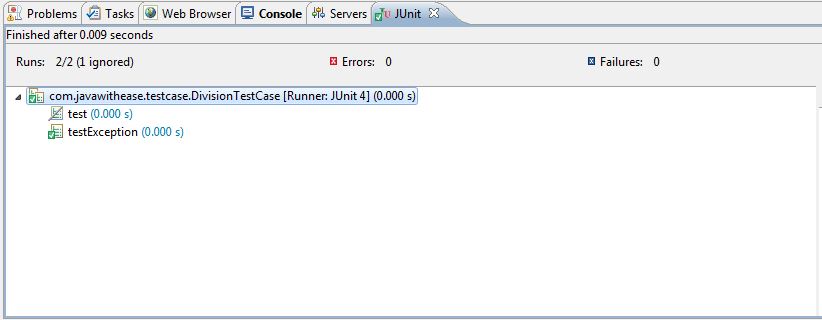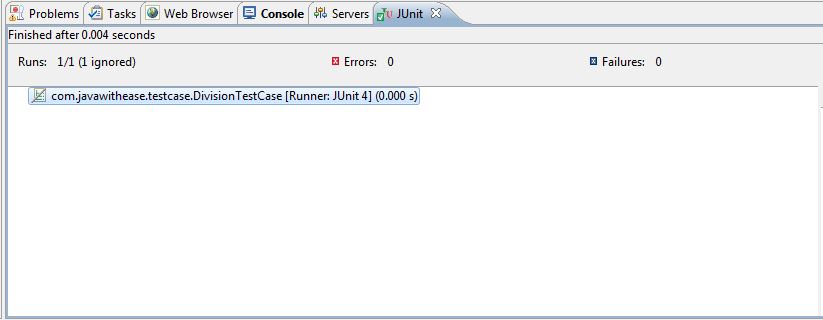The @Ignore annotation is used to ignore test cases. The @Ignore annotation can be used with method or class. If it is used with the method then that method will be ignored by JUnit and will not execute and if it is used with the class then all methods of that class will be ignored and no method will execute.
Junit ignore test example at method level:
DivisionTestCase.java
import com.w3schools.business.*; import static org.junit.Assert.*; import org.junit.Ignore; import org.junit.Test; /** * This is test case class for ignore test at method level. * @author w3schools */ public class DivisionTestCase { //DivisionTest class objects DivisionTest divisionTest1 = new DivisionTest(10, 2); DivisionTest divisionTest2 = new DivisionTest(10, 0); //Test case for division, As we specify ignore annotation, //this test case will not execute. @Test @Ignore public void test() { assertEquals(5, divisionTest1.division()); } //Test case for expected ArithmeticException, //As in this case ArithmeticException // is the expected exception so JUnit //will pass this unit test. @Test(expected = ArithmeticException.class) public void testException() { assertEquals(5, divisionTest2.division()); } } |
DivisionTest.java
/** * This is simple java class containing division method. * @author w3schools */ public class DivisionTest { //data members int num1, num2; //parameterised constructor public DivisionTest(int num1, int num2){ this.num1 = num1; this.num2 = num2; } //division method public int division() throws ArithmeticException{ return num1/num2; } } |
Output:

Junit ignore test example at class level:
DivisionTestCase.java
import com.w3schools.business.*; import static org.junit.Assert.*; import org.junit.Ignore; import org.junit.Test; /** * This is test case class for ignore test at class level. * As we specify ignore annotation at class * no test case will execute. * @author w3schools */ @Ignore public class DivisionTestCase { //DivisionTest class objects DivisionTest divisionTest1 = new DivisionTest(10, 2); DivisionTest divisionTest2 = new DivisionTest(10, 0); //Test case for division @Test public void test() { assertEquals(5, divisionTest1.division()); } //Test case for expected ArithmeticException, //As in this case ArithmeticException // is the expected exception so //JUnit will pass this unit test. @Test(expected = ArithmeticException.class) public void testException() { assertEquals(5, divisionTest2.division()); } } |
DivisionTestCase.java
/** * This is simple java class containing division method. * @author w3schools */ public class DivisionTest { //data members int num1, num2; //parameterised constructor public DivisionTest(int num1, int num2){ this.num1 = num1; this.num2 = num2; } //division method public int division() throws ArithmeticException{ return num1/num2; } } |
Output:

Download this example.
Next Topic: JUnit time test.
Previous Topic: JUnit expected exception test.